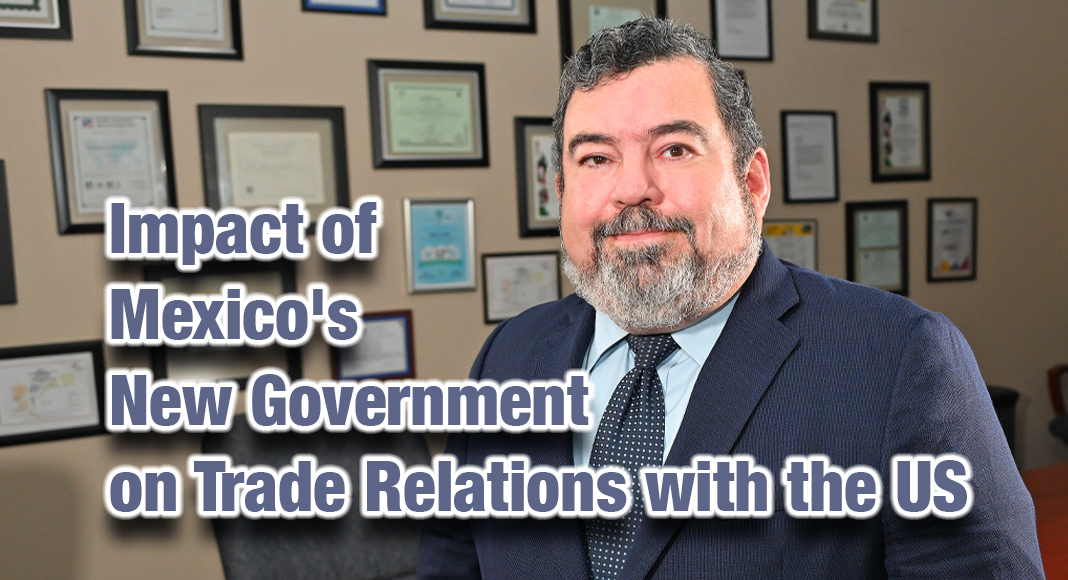
Texa Border Business
By Roberto Hugo González
The recent election of Claudia Sheinbaum as Mexico’s new president has raised significant questions about the future of trade relations with the United States. With her tenure set to begin on October 1, 2024, industry analysts, such as Jorge Torres, President and operator of Interlink Trade Services, offer insights into what this change could mean for cross-border commerce.
Continuation of the 4th Transformation
Torres views Sheinbaum’s election as a continuation of President Lopez Obrador’s “4ta Transformación,” or Fourth Transformation. While expected, Sheinbaum’s victory came with an unexpectedly large margin of nearly 60% of the vote (59.7594 % Source INE), signaling strong public support for the Morena party’s direction. This result suggests a mandate for continued reforms, but it also raises concerns about the future landscape of international trade, especially given the challenges experienced under AMLO’s administration.
Bureaucratic Shifts and Financial Strains
Under AMLO, international trade processes in Mexico saw an increase in manual and bureaucratic procedures, leading to delays in acquiring necessary permits. Raquel Buenrostro’s move from the Servicio de Administracion Tributaria (SAT) to the Secretaria de Economia intensified regulatory scrutiny. Companies, particularly those in the Maquiladora industry, faced more frequent audits for value-added certification and Authorized Economic Operator (AEO) certifications. This heightened scrutiny resulted in suspensions and increased tax liabilities, creating cash flow challenges for many businesses.
Currency and Tariff Impacts
The strengthening of the Mexican peso compounded these financial strains. As the exchange rate shifted from 20 pesos per dollar to 17 pesos per dollar, companies operating in dollars weakened their financial positions. Concurrently, the Mexican government’s response to U.S. pressure on China led to significant tariffs on over 500 harmonized classifications. This included up to 50% tariffs on sensitive materials like steel, plastics, and chemicals, affecting even Maquiladoras that typically benefit from duty-free imports for temporary manufacturing processes.
Policy Concerns and Nearshoring Prospects
The suspension of programs like Rule 8, which previously allowed special permits for importing certain commodities duty-free, further complicated the trade environment. Torres stresses that these changes send negative signals to the trade community, particularly the Maquiladora industry, which stands to benefit significantly from nearshoring opportunities. If the new administration continues on this trajectory, the anticipated influx of companies leveraging nearshoring might not materialize.
A Call for a Business-Friendly Approach
Torres remains cautiously optimistic that President-elect Sheinbaum will recognize the need to create a more business-friendly environment. He emphasizes the importance of incentives to attract companies to Mexico, urging the new administration to correct the path set by AMLO. The future of Mexico-U.S. trade relations hinges on whether Sheinbaum can balance the continuation of the Fourth Transformation (4ta Transformación) with the economic realities and needs of the international business community.
Torres emphasizes that while the new government represents continuity in many respects, adjustments are critical to fostering a more conducive environment for trade and investment. The coming months will determine whether Mexico can capitalize on nearshoring trends and strengthen its trade relations with the U.S. under Sheinbaum’s leadership.
Torres admits that there is a challenge for the new administration’s ability to improve the current trade framework, pointing out that AMLO’s government replaced technocrats with individuals with more socialist viewpoints. This shift in ideology has led to a focus on social welfare over business-friendly policies. Torres fears that Sheinbaum’s administration will continue this trend, potentially complicating efforts to attract and support nearshoring initiatives.
Torres points out that the previous administrations from the Institutional Revolutionary Party (PRI) and the National Action Party (PAN) included individuals educated at prestigious institutions like Harvard and Yale, bringing in-depth knowledge of economic sectors and commercial trade. In contrast, the current administration’s approach might not provide the necessary expertise to foster a pro-business environment. Torres remains hopeful that Sheinbaum will recognize the importance of integrating diverse training backgrounds to capitalize on nearshoring opportunities.
Infrastructure Challenges
Mexico’s infrastructure, particularly water, electricity, and road bridges, is a significant concern for nearshoring prospects. Torres highlights ongoing issues on both sides of the border, with water and electricity being critical factors. Companies are already considering investments in more business-friendly Central and South American countries, such as El Salvador and Argentina, which offer better resources and infrastructure.
Brazil, despite having a more socialist government, is also attracting investments due to its abundant resources. To compete, Mexico needs to address its infrastructure shortcomings. Torres suggests that the government and private sector must collaborate to improve the electrical grid and transportation infrastructure, ensuring these developments are prioritized to attract and retain businesses.
The Persistent Issue of Violence
Violence remains a significant barrier to attracting nearshore investments in Mexico. Torres notes that despite AMLO’s claims, violence and homicides have increased, with political adversaries often silenced or killed. This issue needs urgent attention to create a safer environment for businesses and workers.
The perception of violence in Mexico is often exaggerated by the US press, with some areas in US cities like Chicago, New York, and Philadelphia experiencing higher crime rates. Nevertheless, ensuring safety and minimizing violence is crucial for Mexico to present itself as a viable and attractive option for nearshoring.
While the upcoming administration under Claudia Sheinbaum represents continuity in many respects, significant challenges need to be addressed to foster a more conducive environment for trade and investment. Jorge Torres emphasizes the need for experience, infrastructure development, and security improvements as critical factors in shaping Mexico’s trade relations with the US.
The upcoming months will determine whether Mexico can capitalize on nearshoring trends and strengthen its trade relations with the US. The new government must balance social welfare initiatives with pro-business policies, leveraging public and private sector collaboration to enhance infrastructure and address security concerns. Only by tackling these issues can Mexico hope to attract and retain the influx of companies essential for its economic growth and stability.
Jorge Torres is the President and owner of Interlink Trade Services, a company that provides international trade services in the following areas: Customs Brokerage, Consulting, and Logistics.















